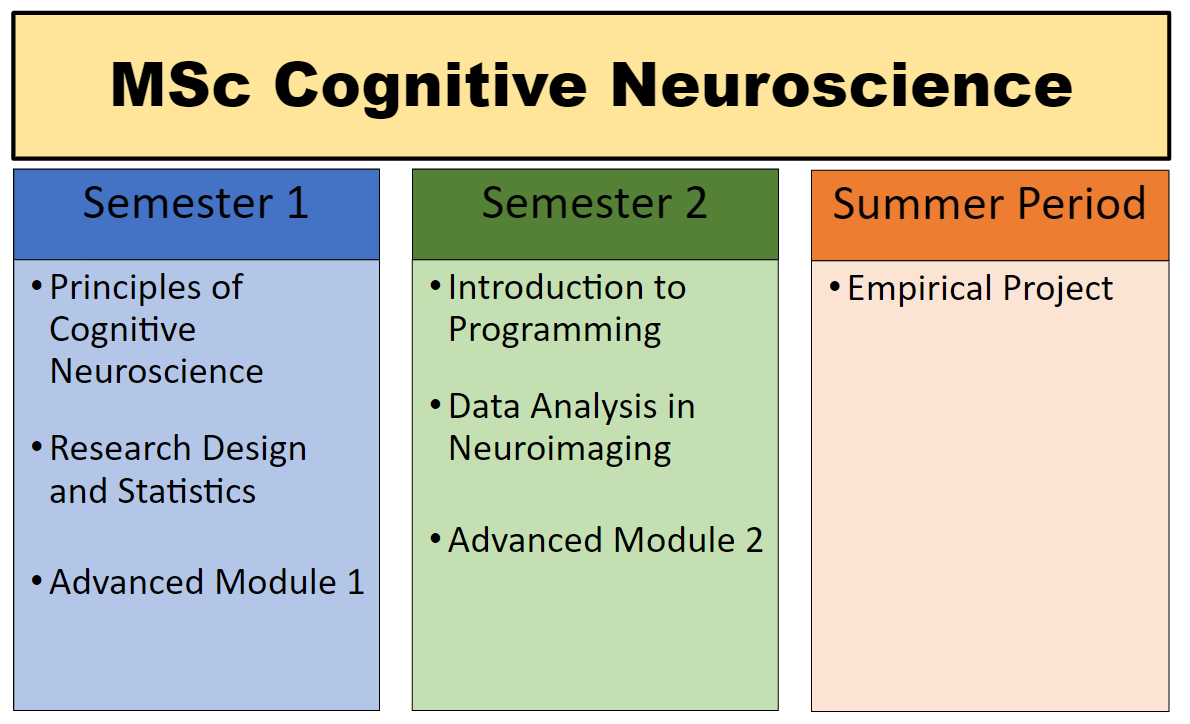MSc Cognitive Neuroscience - Course Overview
Course Directors: Prof Tim Andrews and Dr Tom Hartley
Introduction
Cognitive neuroscience aims to explain cognitive processes and behaviour in terms of the underlying brain mechanisms. It is based on the belief that knowledge about the fundamental mechanisms of the nervous system can lead to a deeper understanding of complex mental functions such as memory, language, emotion, perception, attention and consciousness. Advances in brain imaging techniques have helped to fuel the growth of this new discipline in which data from neuroscience informs psychological theories and vice versa. The MSc is designed to show students how modern techniques in brain imaging can be used to ask questions about the way in which the brain and mind work.
To put it simply: how does the brain think?
Provided jointly by the Department of Psychology and the York Neuroimaging Centre (YNiC), the overarching aim of the MSc in Cognitive Neuroscience at York is to provide a bridge between undergraduate study and PhD research in cognitive neuroscience. Modern brain imaging methods such as functional magnetic resonance imaging (fMRI) and magnetoencephalography (MEG) allow researchers to measure changes in brain activity as people undertake different tasks. Through our specialist modules students gain hands on experience with fMRI and MEG, learning how to design, analyze and evaluate neuroimaging experiments. Finally, students complete an extended empirical project supported by the state-of-the-art facilities at YNiC.
Core Modules
Specialist Modules
Specialist modules place neuroimaging in the wider context of cognitive neuroscientific research and introduce students to the principles of neuroimaging the design of neuroimaging experiments and specialist methods required for the analysis of neuroimaging data. These include:
- Principles of Cognitive Neuroscience Introduces the field of cogntive neuroscience, its key methods, delving into the theoretical basis of two key methods fMRI and MEG and giving you the chance to begin designing your own experiments.
- Data Analysis in Neuroimaging provides a practical understanding of how neuroimaging experiments are analyzed, hands-on with neuroimaging data and YNiC's specialist computer systems.
- Introduction to Programming provides an introduction to how programming (in Python) can be used to generate and present experimental stimuli for neuroimaging experiments and for the analysis of neuroimaging data.
Optional Modules
Each semester you can choose one from a range of optional modules that go into depth with specific areas of cognitive neuroscience and related topics in psychology.
Empirical Project (MSc Requirement)
The Empirical Project enables students to participate in the design and implementation of a theoretically-motivated piece of pure or applied research in cognitive neuroscience providing hands-on training in advanced brain imaging or other cognitive neuroscientific methods. Topics are chosen so as to be timely and practicable within the relevant resource and time constraints. We regard it as important that the topic not only engages the interest and enthusiasm of the student, but is also a good match to the specialist expertise and knowledge of the supervisor.
Literature Review (Diploma Only)
The opportunity to work towards a Diploma qualification is offered to students whose work does not reach the standard of a MSc qualification. For these students, a literature review is required in place of an empirical project. The literature review aims to teach Diploma students to critically appraise and write about a specific issue in cognitive neuroscience. Through this assignment, students will demonstrate an ability to think and write about an issue in their chosen field of study in an insightful and educated way. The literature review takes place during the Summer Term. The 6000 word final essay accounts for 100% of the Literature Review module mark.
To contact the Student Documentation maintainers please email psychology-student-docs-group@york.ac.uk (use your University of York email address).
